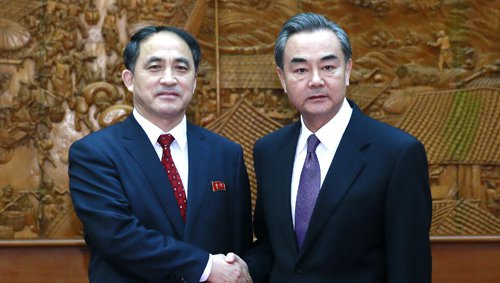
PYONGYANG IN BEIJING: STRAINED TIES, ENDURING INTERESTS

Ri Kil-song, North Korea’s vice foreign minister, has exchanged routine pleasantries on a visit to Beijing over the past week lauding their “traditional friendship”; relations between the two, however, have become icy.
This week’s visit, which wraps up on Saturday, comes just days after Beijing announced it had suspended North Korean coal imports – a critical lifeline for the regime. China’s foreign ministry also issued mild reprimands in response to North Korea’s ballistic missile test in mid-February.
The assassination of Kim Jong-nam has also strained ties. The half-brother of North Korea’s 33-year old ruler had been living in the Chinese-administered region of Macau, reportedly under Beijing’s protection. His brazen murder in a Malaysian airport – just outside the reach of Chinese officials – has ruffled feathers.
Despite the turbulence, mutual strategic interests between China and North Korea will preserve the current relationship dynamics. Both neighbours strongly oppose the US missile defence system currently being installed in South Korea. For its part, Beijing wants the status quo to endure – both to prevent a humanitarian catastrophe along its border and to maintain a buffer state between itself and South Korea, where 30,000 US troops are stationed.
RECONCILING THE NEIGHBOURS: EU MEDIATES IN THE BALKANS

The EU is forging ahead with its long-running mediation in the troubled Western Balkans. On Saturday, Federica Mogherini, the EU’s high representative for foreign affairs and security policy, visits Kosovo.
Brussels has been trying to draw its fractious Balkan neighbours closer to the union since the end of the Yugoslav Wars in the 1990s. However, before being considered for EU membership, states are required to resolve their territorial disputes – a prerequisite that Serbia and Kosovo have especially struggled with. Tensions have intensified since the start of this year, when Serbia tried to send a train covered with the text “Kosovo is part of Serbia” to Kosovo.
Mogherini’s stop in Pristina today is unlikely to produce new agreement. With the presidential election in Serbia coming up, candidates are likely to play the nationalism card in order to bolster their popularity, meaning Brussels must double down on its mediation efforts.
ROUGH SEAS AHEAD: CAMEROON

Cameroon’s main opposition party will hold a demonstration in the port city of Douala on Saturday to demand a return to federalism. Similar events over the past year have resulted in several deaths and hundreds of arrests, making violent confrontations on Saturday likely.
At the heart of the unrest is the alleged suppression of Cameroon’s English-speaking minority by the French-speaking majority. Tensions have been exacerbated by chronic corruption, economic mismanagement and the dominance of the People’s Democratic Movement, which has governed Cameroon since independence in 1960.
Protests by Anglophone Cameroonians last November and again in January resulted in the government shutting down local internet access and media outlets.
A government ban on Saturday’s protest – which won’t be followed – is likely to further strain ties between Anglophones and the ruling party and could even strengthen calls for secession. With elections slated for 2018, Cameroon’s English-speakers will continue to demand change – by vote, protest or force.
HAPPENING ELSEWHERE…
Austrian far-right party FPO holds its annual party convention in Klagenfurt. Recent polls suggest that the FPO is Austria’s strongest party. The next parliamentary elections are scheduled for autumn 2018; however, it’s doubtful whether the grand coalition between SPO and OVP can hold until then.

